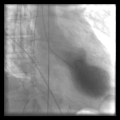Cardiac ventriculography
Cardiac ventriculography is a medical imaging test used to assess the heart's ventricular function, particularly the left ventricle, which is responsible for pumping oxygenated blood to the body. This procedure involves the injection of a contrast agent into the heart's ventricles to enhance the visibility of the heart's structures during X-ray imaging. Cardiac ventriculography provides valuable information about the size, shape, and pumping function of the ventricles, and it is commonly used to diagnose and monitor various cardiac conditions.
Procedure[edit]
The procedure is typically performed in a hospital's catheterization lab. It involves the insertion of a catheter, a thin, flexible tube, into a blood vessel, usually in the groin or arm. The catheter is carefully guided through the vascular system to the heart under fluoroscopic (X-ray) guidance. Once the catheter reaches the ventricles, a contrast agent is injected, and X-ray images are taken. These images can reveal abnormalities in the ventricular wall motion and ejection fraction, which is a measurement of the percentage of blood pumped out of the ventricles with each heartbeat.
Indications[edit]
Cardiac ventriculography is indicated for patients with suspected or known heart diseases, including:
It is also used to assess heart function in patients with symptoms such as:
Risks and Complications[edit]
While cardiac ventriculography is generally safe, it carries some risks and potential complications, including:
- Allergic reaction to the contrast agent
- Bleeding at the catheter insertion site
- Infection
- Arrhythmias (irregular heartbeats)
- Kidney damage (particularly in patients with pre-existing kidney issues)
Interpretation of Results[edit]
The results of cardiac ventriculography provide detailed information about the heart's ventricular function. Abnormal results may indicate:
- Reduced ejection fraction, suggesting weakened heart muscle
- Abnormal ventricular size, indicating dilation or hypertrophy
- Abnormalities in wall motion, which may suggest areas of cardiac ischemia or previous myocardial infarction
Treatment and Management[edit]
Treatment depends on the underlying condition identified through ventriculography. Management may include:
- Medication for heart failure or arrhythmias
- Coronary artery bypass surgery for significant coronary artery disease
- Valve repair or replacement for heart valve disease
- Lifestyle modifications and monitoring for less severe conditions
Conclusion[edit]
Cardiac ventriculography is a crucial diagnostic tool in cardiology, providing essential information about the heart's ventricular function. It aids in the diagnosis, assessment, and management of various cardiac conditions, contributing to improved patient outcomes.
Ad. Transform your life with W8MD's Budget GLP-1 injections from $75


W8MD offers a medical weight loss program to lose weight in Philadelphia. Our physician-supervised medical weight loss provides:
- Weight loss injections in NYC (generic and brand names):
- Zepbound / Mounjaro, Wegovy / Ozempic, Saxenda
- Most insurances accepted or discounted self-pay rates. We will obtain insurance prior authorizations if needed.
- Generic GLP1 weight loss injections from $75 for the starting dose.
- Also offer prescription weight loss medications including Phentermine, Qsymia, Diethylpropion, Contrave etc.
NYC weight loss doctor appointmentsNYC weight loss doctor appointments
Start your NYC weight loss journey today at our NYC medical weight loss and Philadelphia medical weight loss clinics.
- Call 718-946-5500 to lose weight in NYC or for medical weight loss in Philadelphia 215-676-2334.
- Tags:NYC medical weight loss, Philadelphia lose weight Zepbound NYC, Budget GLP1 weight loss injections, Wegovy Philadelphia, Wegovy NYC, Philadelphia medical weight loss, Brookly weight loss and Wegovy NYC
|
WikiMD's Wellness Encyclopedia |
| Let Food Be Thy Medicine Medicine Thy Food - Hippocrates |
Medical Disclaimer: WikiMD is not a substitute for professional medical advice. The information on WikiMD is provided as an information resource only, may be incorrect, outdated or misleading, and is not to be used or relied on for any diagnostic or treatment purposes. Please consult your health care provider before making any healthcare decisions or for guidance about a specific medical condition. WikiMD expressly disclaims responsibility, and shall have no liability, for any damages, loss, injury, or liability whatsoever suffered as a result of your reliance on the information contained in this site. By visiting this site you agree to the foregoing terms and conditions, which may from time to time be changed or supplemented by WikiMD. If you do not agree to the foregoing terms and conditions, you should not enter or use this site. See full disclaimer.
Credits:Most images are courtesy of Wikimedia commons, and templates, categories Wikipedia, licensed under CC BY SA or similar.
Translate this page: - East Asian
中文,
日本,
한국어,
South Asian
हिन्दी,
தமிழ்,
తెలుగు,
Urdu,
ಕನ್ನಡ,
Southeast Asian
Indonesian,
Vietnamese,
Thai,
မြန်မာဘာသာ,
বাংলা
European
español,
Deutsch,
français,
Greek,
português do Brasil,
polski,
română,
русский,
Nederlands,
norsk,
svenska,
suomi,
Italian
Middle Eastern & African
عربى,
Turkish,
Persian,
Hebrew,
Afrikaans,
isiZulu,
Kiswahili,
Other
Bulgarian,
Hungarian,
Czech,
Swedish,
മലയാളം,
मराठी,
ਪੰਜਾਬੀ,
ગુજરાતી,
Portuguese,
Ukrainian

